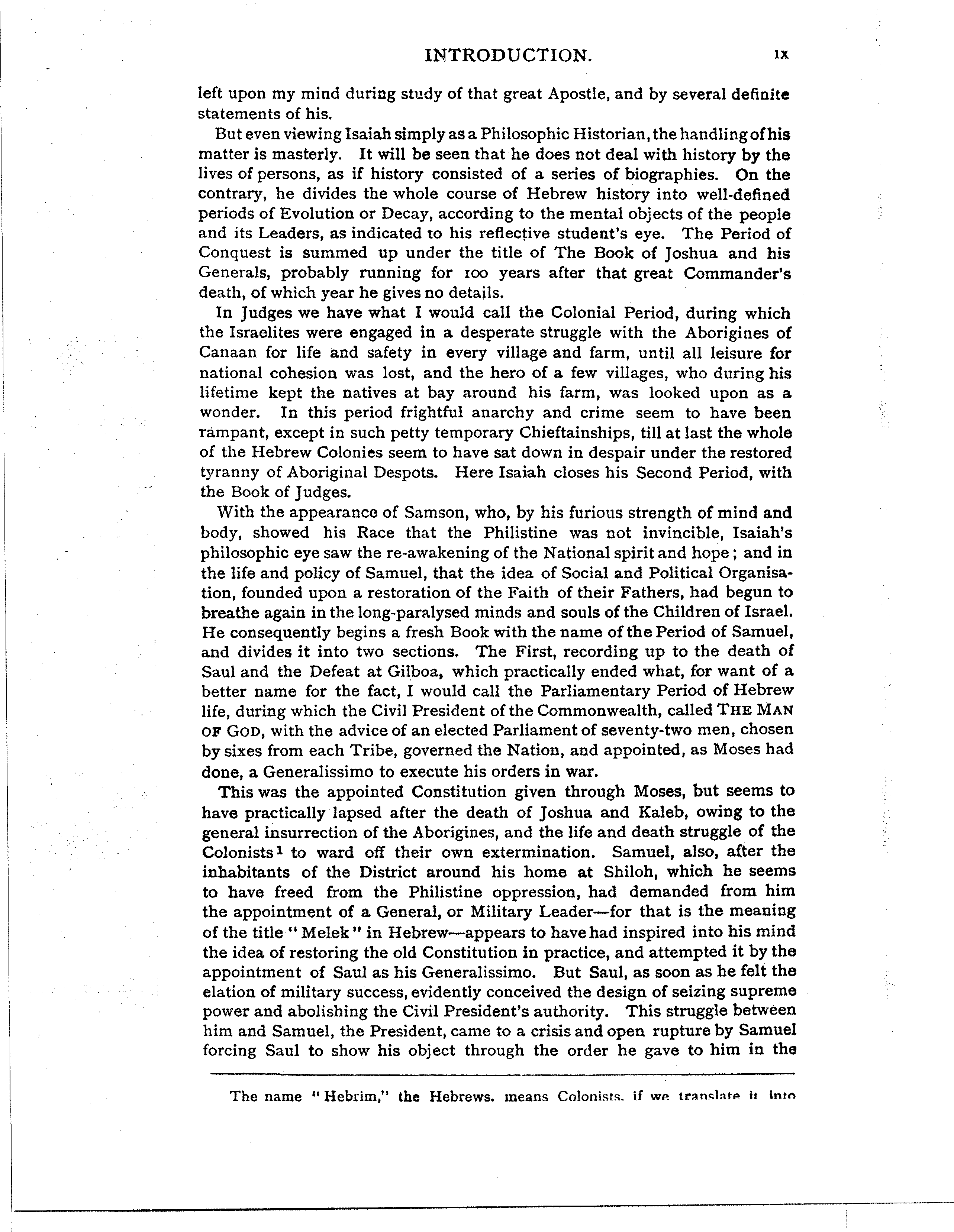Deuteronomy (The Speeches of Moses) - Ferrar Fenton Bible Translation page 219
The Five Books of Moses
left upon my mind during study of that great Apostle, and by several definite statements of his. But even viewing Isaiah simply as a Philosophic Historian, the handling of his
matter is masterly. It will be seen that he does not deal with history by the lives of persons, as if history consisted of a series of biographies. On the contrary, he divides the whole course of Hebrew history into well-defined periods of Evolution or Decay, according to the mental objects of the people and its Leaders, as indicated to his reflective student’s eye. The Period of Conquest is summed up under the title of The Book of joshua and his Generals, probably running for xoo years after that great Commander’s death, of which year he gives no details. In judges we have what I would call the Colonial Period, during which
the Israelites were engaged in a desperate struggle with the Aborigines of Canaan for life and safety in every village and farm, until all leisure for national cohesion was lost, and the hero of a few villages, who during his lifetime kept the natives at bay around his farm, was looked upon as a wonder. In this period frightful anarchy and crime seem to have been rampant, except in such petty temporary Chieftainships, till at last the whole of the Hebrew Colonies seem to have sat down in despair under the restored tyranny of Aboriginal Despots. Here Isaiah closes his Second Period, with the Book of judges. With the appearance of Samson, who, by his furious strength of mind and
body, showed his Race that the Philistine was not invincible, Isaiah's philosophic eye saw the re-awakening of the National spirit and hope; and in the life and policy of Samuel, that the idea of Social and Political Organisa- tion, founded upon a restoration of the Faith of their Fathers, had begun to breathe again in the long—paralysed minds and souls of the Children of Israel. He consequently begins a fresh Book with the name of the Period of Samuel, and divides it into two sections. The First, recording up to the death of Saul and the Defeat at Gilboa, which practically ended what, for want of a better name for the fact, I would call the Parliamentary Period of Hebrew life, during which the Civil President of the Commonwealth, called THE MAN OF Gon, with the advice of an elected Parliament of seventy-two men, chosen by sixes from each Tribe, governed the Nation, and appointed, as Moses had done, a Generalissimo to execute his orders in war. This was the appointed Constitution given through Moses, but seems to
have practically lapsed after the death of joshua and Kaleb, owing to the general insurrection of the Aborigines, and the life and death struggle of the Colonistsl to ward off their own extermination. Samuel, also, after the inhabitants of the District around his home at Shiloh, which he seems to have freed from the Philistine oppression, had demanded from him the appointment of a. General, or Military Leader-·~—for that is the meaning in Hebrew-—appears to have had inspired into his mind the idea of restoring the old Constitution in practice, and attempted it by the appointment of Saul as his Generalissimo. But Saul, as soon as he felt the elation of military success, evidently conceived the design of seizing supreme power and abolishing the Civil President’s authority. This struggle between him and Samuel, the President, came to a crisis and open rupture by Samuel forcing Saul to show his object through the order he gave to him in the the Hebrews. means Coloniszs. if we zranslam iz mm
